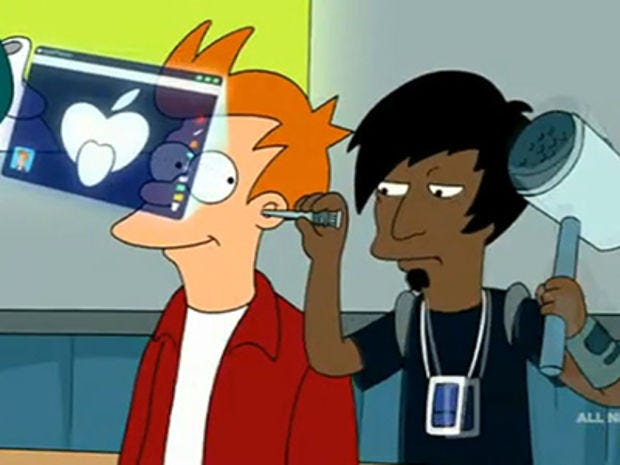So What, Who Cares (vol 2, issue 89) What's the big deal about cognitive division of labor
Hello!
I want to begin today's newsletter by giving a huge and heartfelt thank you to NPR's Pop Culture Happy Hour, where Margaret H. Wilson (@msfridaynext) cited this newsletter as one of the things that makes her happy. I need to find the proper GIF for my hands-flappingly giddy excitement. I am taking suggestions/submissions via Twitter or email.
*

Do you think you're smart? Blame Google. Or any search engine, really --psychology graduate student Matthew Fisher conducted a study to see how much people knew versus how much they think they know, and found that:
(Study) participants who had searched for information on the internet believed they were far more knowledgeable about a subject that those who had learned by normal routes, such as reading a book or talking to a tutor. Internet users also believed their brains were sharper.
So what? The study's author thinks the real problem is that people are going to become "more likely for people to consider knowledge stored online as their own." A corollary concern is that people are simply swallowing search engine results as factually correct.
Who cares? Anyone who uses search engines. But not because we're all worked up over the Internet making us dumber than people who learned the U.S. state capitals from flashcards. The notion of cognitive division of labor (i.e. storing what you "know" elsewhere) isn't new: U.C. Berkeley's Tania Lombrozo argues:
"If we can't store everything in our own heads, we need good ways to track what we can expect to learn from others. It's not enough to outsource information storage to other minds if we can't retrieve it when we need it back."
And in the Terry Pratchett book Thief of Time, there's a memorable exchange:
[War asks:] “Erm… dear, do I ride out for Apocalypses?”
Mrs. War took the lid off a saucepan and prodded viciously at something inside.
“No, dear,” she said firmly. “You always come down with a cold.”
“I thought I rather, er, sort of liked that kind of thing…?”
“No, dear. You don’t.”
Despite himself, Death was fascinated. He had never come across the idea of keeping your memory inside someone else’s head.
So the issue isn't that we have a porous boundary between "stuff in our mind" and "stuff that lives somewhere else." The real issue comes down to how reliable and universal a search engine's results are.
A Cornell study recently found that Google "has increasingly developed and promoted its own content as an alternative to results from other websites."

Granted, that study was conducted because Yelp is all sorts of worked up over how Google's results may or may not be affecting its business and the emphasis on both the FTC and EU investigations into Google's search results is on how the results are harming people's chances to spend money.
But the larger point remains. Search engine results may be skewed to suit specific business purposes, and they can be heavily weighted to cater to specific users based on past search results. So what you think you "know" by searching for answers may equal what you could know if the tools you were using weren't weighted in ways you may not be able to see or understand for yourself.
*
We are still not done dealing with the repercussions of the Aughties' housing bubble. And no, I am not talking about an epidemic of unloved stainless-steel refrigerators. Home equity lines of credit (HELOCs) originations -- i.e. people borrowing money against the presumed value of their house -- began surging in 2005 and peaked in 2007 before dropping as the real estate bubble burst. And now, after a decade or so of interest-only payments, a small but growing percentage of HELOC borrowers are delinquent on their loans.

According to Equifax, the percentage of delinquent borrowers on a HELOC is 2.7% at the very end of the interest-only period. When the payments reset to reflect paying against principle as well as interest -- meaning the payments rise by hundreds or thousands of dollars monthly -- that percentage jumps to 4.3%.
J.P. Morgan Chase and Bank of America, which report HELOC balances in terms of money owed and not number of customers who have them, have both said their delinquent HELOC balances have increased dramatically year-over-year as more HELOCs have shifted from interest-only to interest-plus-principle.
So what? The surging numbers suggest that a number of people who took out HELOCs a decade ago are in no better financial shape than when they began using their houses as collateral. Not surprising when you consider how stagnant American workers' wages have been (vol 1, issue 48).

Who cares? Banks will, because they don't really sell off HELOCs. This means they bear the brunt of any defaults. And when banks lose money, who does it affect? You. And if bank customers default on their HELOCs, the banks can take the houses (since they were collateral in the now-defaulted loans), and that could affect housing markets all over the U.S.
It will be interesting to see how banks are going to deal with this wave of HELOC delinquencies: They can work with these customers to do damage control or they can consider restructuring their repayment plans. It will also be interesting to see when -- or whether -- our politicians realize something's going on with the HELOC holders of America.
*
Your moment in pop culture: One of my favorite techniques for battling distraction is to listen to TV shows as I work. Not watch -- listen. And one of my go-tos is David Starkey, who has made something of a name for himself in the U.K. for his ability to translate Britain's history into dishy documentaries and his ability to say really questionable things in the press.

Setting aside Starkey's reputation as a "one-man gaffe machine" for the nonce, I want to recommend that you give two series of his a listen and/or watch: The Six Wives of Henry VIII and David Starkey's Monarchy. The former is a dishy rundown of Henry VIII's marital history while the latter does a wonderful job of explaining how the British conception of the monarchy was created, defined and redefined over nearly 1600 years.
The thing both shows have in common: Starkey's ability to gossip about historic figures. Nobody is safe from his droll delivery -- Emma of Normandy, Piers de Gaveston, Elizabeth Woodville and Catherine of Aragon all come in for some pointed remarks.
There's a YouTube playlist with a lot of David Starkey talking about Henry VIII, and the first two seasons of Monarchy with David Starkey are available on Netflix (streaming) for stateside viewers. You can also find DVDs of both on Amazon.
And for extra credit: Starkey's Six Wives: The Queens of Henry VIII is great beach reading (so much historical side-eye given to so many people!).
If you feel like flinging yourselves further back in history, I recommend The Plantagenets: the Warrior Kings and Queens Who Made England. That read will put one of my favorite The Lion in Winter bits into perspective:
Prince John: A knife! He's got a knife!
Eleanor of Aquitaine: Of course he has a knife, he always has a knife, we all have knives. It's 1183 and we're barbarians.
Anyway, enjoy listening to David Starkey snigger about getting to the bottom of Edward II's murder.
*
Are there typos? Copyediting is the only editing class I did not earn an A in. I'm trying the David Pogue-suggested method of changing a font to see if that helps, but any other tips appreciated.
Any suggestions for links gratefully received -- hit me up via Twitter and email. And any feedback is welcome. Again --hit me up via Twitter and email.
Really like this newsletter? TELL A FRIEND TO SUBSCRIBE! Then you and your friend will never have any awkward small talk again because you can talk about this newsletter.

